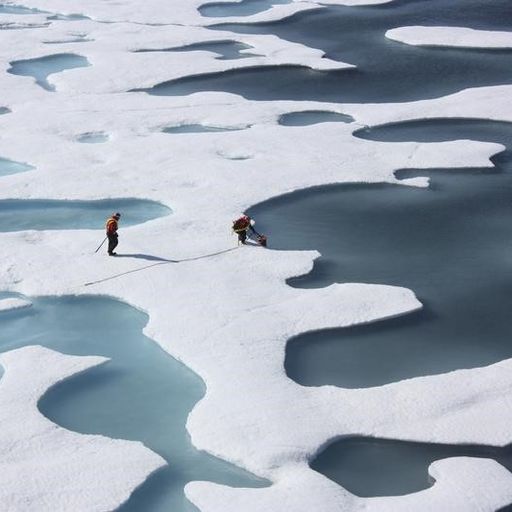
Melting ice sheets caused global sea levels to rise up to 18 metres, scientists say
Oceans campaigner and champion swimmer Lewis Pugh will attempt "the coldest swim on Earth" to highlight the damaging effects of climate change.
The UN patron of oceans will tackle the 10km mouth of the Ilulissat Icefjord in Greenland over the course of two weeks.
A heritage site, it is the world's fastest-moving glacier - shifting an average of 30m per day and calving over 30 cubic km of ice into the sea every year.
To prepare for the challenge, Pug is currently training in Iceland as part of his cold-water adaptation program.
In the final days, before his swim starts on 25 August, he will move his training to Greenland.
The 51-year-old said the swim will be the "most challenging of my career", and it will be the world's first multi-day swim in the polar regions.
"The cold-water adaptation and training alone is gruelling and extremely intense on the body. But there is a reason I'm doing this," he said.
"We are an ice-dependent species. Ice keeps our planet cool enough for us to live. The polar regions and high-altitude glaciers are melting, and our collective survival is on the line.
"No ice, no life."
It is likely he will swim further than 10km direct distance, as he will have to navigate around icebergs and brash ice. The water will be near freezing and the wind chill could see temperatures plummet into negative numbers.
Pugh is calling for 30% of the world's oceans to be protected by 2030. The challenge follows a landmark report from the United Nations that says the global warming limit of 1.5C could be hit within 20 years - with heatwaves, flooding and droughts becoming more frequent and more intense.
If the entire Greenland Ice Sheet were to melt, it would lead to a global sea level rise of over 7m (23ft).
One billion people live less than 10m (33ft) above sea level, and a one-metre rise could drown major cities like London, Tokyo and New York.
Subscribe to ClimateCast on Spotify, Apple Podcasts, or Spreaker.
Following the swim, Pugh will travel to London to meet with key leaders before attending climate conference COP26 in November in Glasgow.
In 2018, he swam the length of the channel, from Land's End to Dover in 50 days, wearing just a cap, trunks and goggles, as part of the worldwide Action for Oceans campaign.
The endurance athlete has swum the waters of the Arctic, the Antarctic and any number of other seas, rivers, streams and lakes and has even done a high-altitude paddle on Mount Everest.